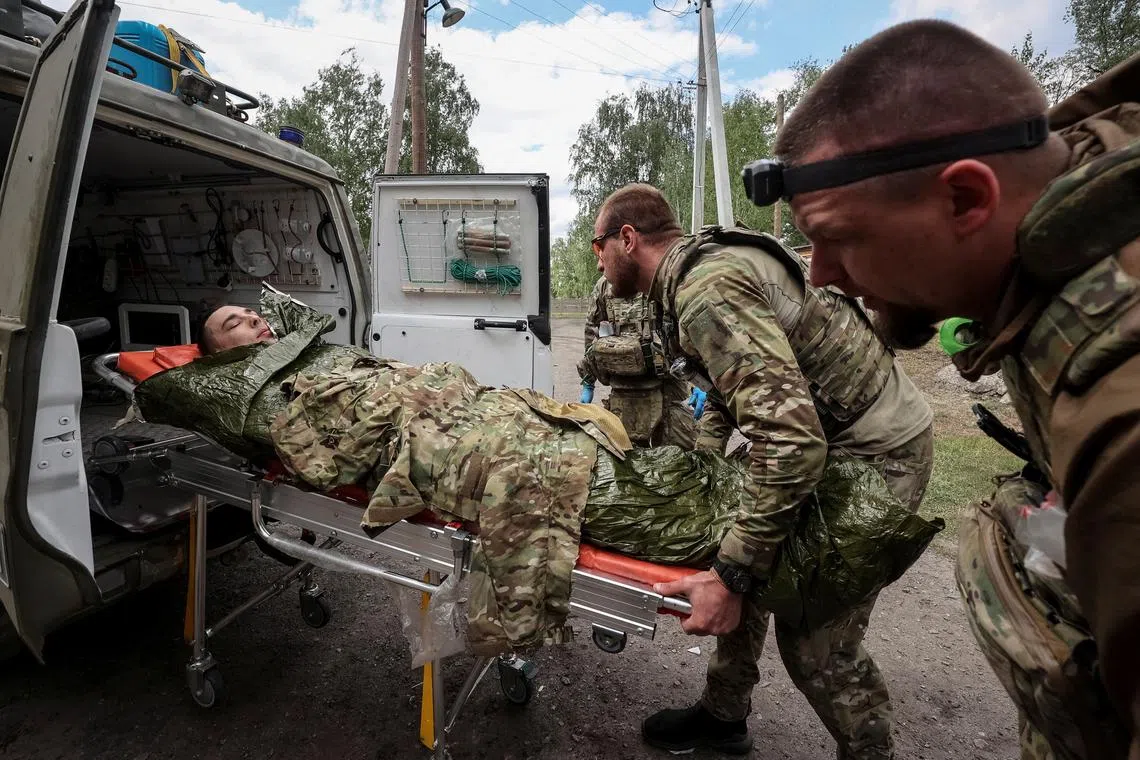Russia stretches Ukraine forces in Kharkiv with small assault groups
Sign up now: Get ST's newsletters delivered to your inbox

Ukraine is currently on the defensive after months of slowed supplies of US munitions.
PHOTO: REUTERS
KYIV – Russia pressed its ground assault into Ukraine’s Kharkiv region on May 13, attacking new areas with small groups to try to widen the front and stretch Ukraine’s forces, the regional governor said.
Moscow’s troops entered Ukraine near its second city, Kharkiv, on May 10, opening a new, north-eastern front in a war that has for almost two years been largely fought in the east and south.
The advance could draw some of Kyiv’s depleted forces away from the east, where Russia has been slowly advancing.
“The enemy is trying to deliberately stretch it (the front line), attacking in small groups but in new directions, so to speak,” Governor Oleh Syniehubov said in televised comments.
“The situation is difficult.”
A day after the Russian offensive began, Ukraine appointed Brigadier-General Mykhailo Drapatyi to take command of the Kharkiv front, the media outlet RBC-Ukraine reported.
Brig-Gen Drapatyi had led the liberation of the southern Kherson region in November 2022 before serving as deputy head of the general staff.
Ukraine is on the defensive after a months-long slowdown in supplies of Western, especially American, military aid that has left Russia with an even greater advantage in manpower and munitions.
More than two years after ordering the invasion of Ukraine, Russian President Vladimir Putin tapped civilian economist Andrei Belousov as his surprise new defence minister on May 12.
Mr Belousov replaces Mr Putin’s long-time ally Sergei Shoigu, who had been in charge of defence since 2012.
New Russian government appointments show that Moscow will try to scale up its war effort and is seeking to reconfigure its economy for its defence needs, Ukrainian presidential adviser Mykhailo Podolyak said on May 13.
“Russia is finally isolating itself and will try to scale up the war, expand its formats while reconfiguring the economy,” he said on Telegram.
In the north-east, Russia’s forces were pushing in several directions, including near the town of Vovchansk and towards the village of Lyptsi, Mr Syniehubov said.
Kyiv’s forces were managing to hold Moscow’s troops back but there was a real threat that the fighting could spread to new settlements, he warned.
Russia said on May 12 that it had captured nine villages in the Kharkiv region. On May 13, it said the troops had improved their positions and inflicted losses on territorial defence forces.
The Ukrainian military, in its daily readout, acknowledged some Russian “tactical successes” and said it was deploying reserves to stabilise the situation.
It said fighting was raging for control of Vovchansk, about 5km from the Russian border.
Mr Syniehubov said about 5,700 people had been evacuated from in and around Vovchansk, and urged the remaining residents, said by local officials to number about 300, to leave.
Thwarted attack
Ukraine said on May 13 that it had thwarted a Russian operation to set off a series of bomb attacks in builder’s markets and near a cafe in the capital of Kyiv, and at a defence enterprise in the western city of Lviv.
Two Russian military agents were detained on suspicion of involvement in the alleged plot and 19 explosive devices were seized, the prosecutor general’s office wrote on Telegram.
The Security Service of Ukraine (SBU) said in a statement that four bombs had been intended for detonation in the capital on May 9, the day Russia celebrates the Soviet victory over Nazi Germany in 1945.
“According to the plan of the Russian special service, the explosives were supposed to detonate during the markets’ peak hours to cause maximum damage to the civilian population,” the agency said on Telegram.
In Kyiv, the explosives intended for builder’s markets were disguised as packages of tea, while a bomb was placed in a car for an explosion near the cafe, according to the SBU.
The Lviv attack was meant to happen in February, the SBU said. An unidentified defence enterprise was the target, according to prosecutors.
Ukraine regularly says it has thwarted attacks away from the front line planned by Russian security services, detaining agents it says are working for Moscow.
Last week, the SBU said it had caught two agents within the State Protection Department plotting the assassination of President Volodymyr Zelensky and the head of military intelligence Kyrylo Budanov. REUTERS


